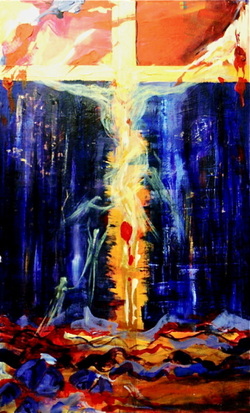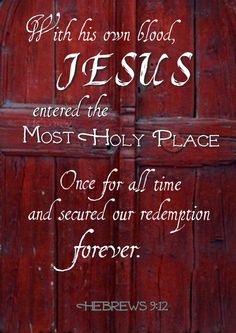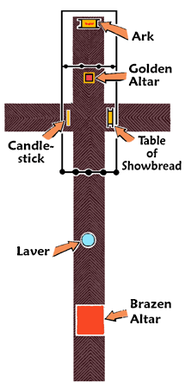Entry 35
Return To The Old Paths
Propitiation
Propitiation
- 2Chr 30:1 And Hezekiah sent to all Israel and Judah, and wrote letters also to Ephraim and Manasseh, that they should come to the house of the LORD at Jerusalem, to keep the passover to the LORD God of Israel.
God sent a message and a messenger redeemer with an invitation to come and have everlasting fellowship with the LORD
We have been looking at the 2 Chronicles Hezekiah account. It is in essence the gospel, it is in itself a message of returning to the old paths; which today means return to the pure and true gospel of Jesus Christ; the Apostle's doctrine.
At some point we must look at some words and concepts which we observe in this 2 Chronicles text. We are at that point. These are essential to the events recorded in the 2 Chronicles account of the Hezekiah revival and to the message being spoken out of this account to us today. They are fundamental to the purpose of returning to the old paths. We have looked at Sanctification and Consecration. Today we look at Propitiation.
PROPITIATION
American Tract Society Bible Dictionary
The offering which appeases the wrath of one against whom an offence has been committed. Christ is "the propitiation for our sins," Ro 3:25, inasmuch as his sacrifice alone removes the obstacles which prevented the mercy of God from saving sinners, and appeases the just wrath of the law, 1Jo 2:2; 4:10. The same Greek word is used in the Septuagint to denote an "atonement," Nu 5:8; a "sin-offering," Eze 44:27; and the covering of the Ark of the Covenant, Le 16:14, Heb 9:5. See MERCY SEAT.
Wikipedia
The Greek word hilasterion is the Greek rendering of the Hebrew kapporeth which refers to the Mercy Seat of the Ark. Hilasterion can be translated as either "propitiation" or "expiation" which then imply different functions of the Mercy Seat. The English dictionary definition of "propitiation" literally means to make favorable and specifically includes the idea of dealing with God’s wrath against sinners. Expiation literally means to make pious and implies either the removal or cleansing of sin.
The idea of propitiation includes that of expiation as its means, but the word "expiation" has no reference to quenching God’s righteous anger. The difference is that linguistically the object of expiation is sin, not God (that is, sin is removed, not God). Linguistically, one propitiates a person (makes them favorable), and one expiates a problem (removes it). Christ's death was therefore both an expiation and a propitiation. By expiating (removing the problem of) sin God was made propitious (favorable) to us.
| Hilasterion Rom 3:25 Whom God has set forth to be a propitiation through faith in his blood, to declare his righteousness for the remission of sins that are past, through the forbearance of God; G2435 ἱλαστήριον hilasterion (hil-as-tay'-ree-on) n. 1. an expiatory (place or thing) 2. (concretely) an atoning victim 3. (specially) the lid of the Ark (in the Temple) [neuter of a derivative of G2433] KJV: mercyseat, propitiation Root(s): G2433 Roots G2433 ἱλάσκομαι hilaskomai (hil-as'-kom-ai) v. 1. to conciliate 2. (transitively) to atone for (sin) 3. (intransitively) be propitious [middle voice from perhaps the alternate form of G138] KJV: be merciful, make reconciliation for Root(s): G138 G138 αἱρέομαι haireomai (hai-reh'-om-ai) (Some of the forms are borrowed from a cognate hellomai hel'-lom-ai; which is otherwise obsolete) v. 1. to take for oneself, i.e. to prefer KJV: choose | Hilasmos 1John 2:2 And he is the propitiation for our sins: and not for our's only, but also for the sins of the whole world. 1John 4:10 Herein is love, not that we loved God, but that he loved us, and sent his Son to be the propitiation for our sins. G2434 ἱλασμός hilasmos (hil-as-mos') n. 1. atonement 2. (concretely) an expiator [(not given)] KJV: propitiation |
MERCY-SEAT
American Tract Society Bible Dictionary
American Tract Society Bible Dictionary
1Ch 28:11, the cover of the Ark of the Covenant, which see. The Hebrew word means a cover, but contains an allusion to the covering or forgiving of sins, Ps 32:1. In the New Testament it is designated by a Greek word meaning "the propitiatory," or "expiatory," Heb 9:4, 5. It was approached only by the high priest, and not without the blood of atonement, to show that the divine mercy can be granted only through the blood of Christ, Ro 3:25.

Matt 27:51 And, behold, the veil of the temple was rent in twain from the top to the bottom; and the earth did quake, and the rocks rent;
Heb 9:1 Then verily the first [covenant] had also ordinances of divine service, and a worldly sanctuary.
Heb 9:2 For there was a tabernacle made; the first, wherein [was] the candlestick, and the table, and the shewbread; which is called the sanctuary.
Heb 9:3 And after the second veil, the tabernacle which is called the Holiest of all;
Heb 9:4 Which had the golden censer, and the ark of the covenant overlaid round about with gold, wherein [was] the golden pot that had manna, and Aaron’s rod that budded, and the tables of the covenant;
Heb 9:5 And over it the cherubims of glory shadowing the mercyseat; of which we cannot now speak particularly.
Heb 9:6 Now when these things were thus ordained, the priests went always into the first tabernacle, accomplishing the service [of God].
Heb 9:7 But into the second [went] the high priest alone once every year, not without blood, which he offered for himself, and [for] the errors of the people:
Heb 9:8 The Holy Ghost this signifying, that the way into the holiest of all was not yet made manifest, while as the first tabernacle was yet standing:
Heb 9:9 Which [was] a figure for the time then present, in which were offered both gifts and sacrifices, that could not make him that did the service perfect, as pertaining to the conscience;
Heb 9:10 [Which stood] only in meats and drinks, and divers washings, and carnal ordinances, imposed [on them] until the time of reformation.
Heb 9:11 But Christ being come an high priest of good things to come, by a greater and more perfect tabernacle, not made with hands, that is to say, not of this building;
Heb 9:12 Neither by the blood of goats and calves, but by his own blood he entered in once into the holy place, having obtained eternal redemption [for us].
Heb 9:13 For if the blood of bulls and of goats, and the ashes of an heifer sprinkling the unclean, sanctifieth to the purifying of the flesh:
Heb 9:14 How much more shall the blood of Christ, who through the eternal Spirit offered himself without spot to God, purge your conscience from dead works to serve the living God?
Heb 9:15 And for this cause he is the mediator of the new testament, that by means of death, for the redemption of the transgressions [that were] under the first testament, they which are called might receive the promise of eternal inheritance.
Heb 9:16 For where a testament [is], there must also of necessity be the death of the testator.
Heb 9:17 For a testament [is] of force after men are dead: otherwise it is of no strength at all while the testator liveth.
Heb 9:18 Whereupon neither the first [testament] was dedicated without blood.
Heb 9:19 For when Moses had spoken every precept to all the people according to the law, he took the blood of calves and of goats, with water, and scarlet wool, and hyssop, and sprinkled both the book, and all the people,
Heb 9:20 Saying, This [is] the blood of the testament which God hath enjoined unto you.
Heb 9:21 Moreover he sprinkled with blood both the tabernacle, and all the vessels of the ministry.
Heb 9:22 And almost all things are by the law purged with blood; and without shedding of blood is no remission.
Heb 9:23 [It was] therefore necessary that the patterns of things in the heavens should be purified with these; but the heavenly things themselves with better sacrifices than these.
Heb 9:24 For Christ is not entered into the holy places made with hands, [which are] the figures of the true; but into heaven itself, now to appear in the presence of God for us:
Heb 9:25 Nor yet that he should offer himself often, as the high priest entereth into the holy place every year with blood of others;
Heb 9:26 For then must he often have suffered since the foundation of the world: but now once in the end of the world hath he appeared to put away sin by the sacrifice of himself.
Heb 9:27 And as it is appointed unto men once to die, but after this the judgment:
Heb 9:28 So Christ was once offered to bear the sins of many; and unto them that look for him shall he appear the second time without sin unto salvation.
Heb 9:1 Then verily the first [covenant] had also ordinances of divine service, and a worldly sanctuary.
Heb 9:2 For there was a tabernacle made; the first, wherein [was] the candlestick, and the table, and the shewbread; which is called the sanctuary.
Heb 9:3 And after the second veil, the tabernacle which is called the Holiest of all;
Heb 9:4 Which had the golden censer, and the ark of the covenant overlaid round about with gold, wherein [was] the golden pot that had manna, and Aaron’s rod that budded, and the tables of the covenant;
Heb 9:5 And over it the cherubims of glory shadowing the mercyseat; of which we cannot now speak particularly.
Heb 9:6 Now when these things were thus ordained, the priests went always into the first tabernacle, accomplishing the service [of God].
Heb 9:7 But into the second [went] the high priest alone once every year, not without blood, which he offered for himself, and [for] the errors of the people:
Heb 9:8 The Holy Ghost this signifying, that the way into the holiest of all was not yet made manifest, while as the first tabernacle was yet standing:
Heb 9:9 Which [was] a figure for the time then present, in which were offered both gifts and sacrifices, that could not make him that did the service perfect, as pertaining to the conscience;
Heb 9:10 [Which stood] only in meats and drinks, and divers washings, and carnal ordinances, imposed [on them] until the time of reformation.
Heb 9:11 But Christ being come an high priest of good things to come, by a greater and more perfect tabernacle, not made with hands, that is to say, not of this building;
Heb 9:12 Neither by the blood of goats and calves, but by his own blood he entered in once into the holy place, having obtained eternal redemption [for us].
Heb 9:13 For if the blood of bulls and of goats, and the ashes of an heifer sprinkling the unclean, sanctifieth to the purifying of the flesh:
Heb 9:14 How much more shall the blood of Christ, who through the eternal Spirit offered himself without spot to God, purge your conscience from dead works to serve the living God?
Heb 9:15 And for this cause he is the mediator of the new testament, that by means of death, for the redemption of the transgressions [that were] under the first testament, they which are called might receive the promise of eternal inheritance.
Heb 9:16 For where a testament [is], there must also of necessity be the death of the testator.
Heb 9:17 For a testament [is] of force after men are dead: otherwise it is of no strength at all while the testator liveth.
Heb 9:18 Whereupon neither the first [testament] was dedicated without blood.
Heb 9:19 For when Moses had spoken every precept to all the people according to the law, he took the blood of calves and of goats, with water, and scarlet wool, and hyssop, and sprinkled both the book, and all the people,
Heb 9:20 Saying, This [is] the blood of the testament which God hath enjoined unto you.
Heb 9:21 Moreover he sprinkled with blood both the tabernacle, and all the vessels of the ministry.
Heb 9:22 And almost all things are by the law purged with blood; and without shedding of blood is no remission.
Heb 9:23 [It was] therefore necessary that the patterns of things in the heavens should be purified with these; but the heavenly things themselves with better sacrifices than these.
Heb 9:24 For Christ is not entered into the holy places made with hands, [which are] the figures of the true; but into heaven itself, now to appear in the presence of God for us:
Heb 9:25 Nor yet that he should offer himself often, as the high priest entereth into the holy place every year with blood of others;
Heb 9:26 For then must he often have suffered since the foundation of the world: but now once in the end of the world hath he appeared to put away sin by the sacrifice of himself.
Heb 9:27 And as it is appointed unto men once to die, but after this the judgment:
Heb 9:28 So Christ was once offered to bear the sins of many; and unto them that look for him shall he appear the second time without sin unto salvation.
The lid of "Mercy Seat" of the ark was where the blood of the sin offering was sprinkled. God said, "There will I meet with you, and I will commune with you from above the mercy seat...." (Exodus 25:22)


 RSS Feed
RSS Feed